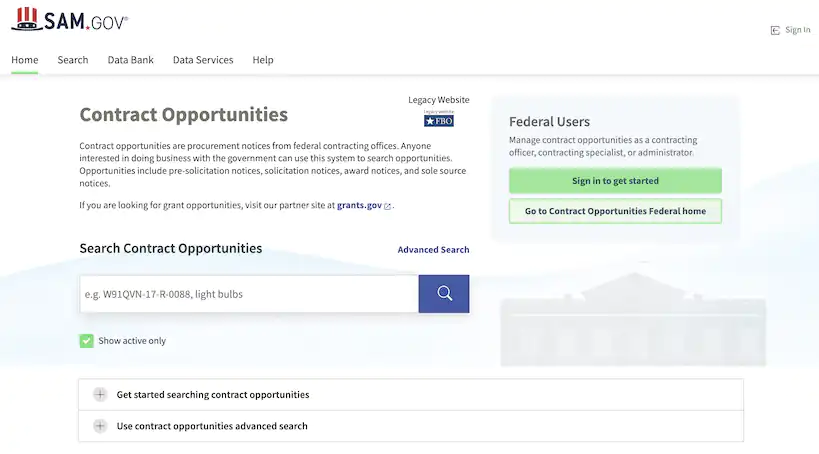Once you’ve registered with SAM, it’s time to look for contracts.
SAM has a powerful search engine that allows you to filter and browse through government solicitations for contracts valued at $25,000 or more. It also lets you look at previous contract awards, which can be a great way to learn how to write a successful proposal.
You’ll want to understand the difference between the types of solicitations. The main types are:
- Invitation for bid (IFB): This is typically when a government purchaser knows what they need and wants to find the best price. An IFB works through a “sealed-bid” process, meaning all parties submit bids without being able to see others’ bids until the agency awards the contract to the winner. There’s little negotiation involved, so make sure you can deliver what’s being asked before responding to an IFB.
- Request for quotation (RFQ): An RFQ uses a process called “simplified acquisition,” in which the government asks for quotations but is not obligated to make an offer. A government agency may put out an RFQ when it’s still trying to figure out its needs and budget for something.
- Request for proposal (RFP): This is when an agency is looking for a solution to its problem. With an RFP, an agency isn’t necessarily looking for the lowest price and will publish a detailed solicitation. You’ll respond to it with a detailed proposal and may have to go back and forth answering questions as you negotiate a contract.
Winning government contracts outside of SAM
Browsing SAM isn’t the only way to find federal contracts. If you know which agencies are likely to want your small business’s products or services, you can follow news related to the agency or look through bills related to that agency in Congress to get a heads up on coming contracting opportunities.
You can look for a Procurement Technical Assistance Center (PTAC) in your area. These local offices assist federal contractors and often offer “bid-matching” services that connect you directly to contracting programs.
There are also government contracting networking events that give you a chance to meet federal officials who will be making procurement decisions. As in all industries, relationships matter in government contracting. Joining a conference, seminar, or happy hour could help you make a critical connection in landing your next contract.
Write a strong proposal
Writing an effective proposal starts with reading the government solicitation carefully. Your proposal should make it clear that you:
- Understand the problem that the agency needs to solve and;
- Explains with specific details how you would solve it.
Your performance record also matters: government timelines can be strict, and purchasers want to see that you have a history of delivering on time.
For an RFP, agencies typically write solicitations using a standard format called Uniform Contract Format (UCF), but each solicitation will have slightly different instructions and requirements. Contact the SBA or your local PTAC if you need help, as some solicitations may have relevant regulations you need to be aware of.
Make sure to answer each question in the solicitation carefully, and label each response so it’s clear which question it relates to. Follow the instructions, double-check your proposal for errors, provide the requested documentation and submit it within the timeframe.
If the government agency is interested in your bid, they may ask you to complete a pre-award survey, which is a way of confirming that you can actually take on the job. You will likely have to meet with the agency, answer their questions and provide evidence that you’re ready.
What happens if you don’t win the government bid?
If you don’t get the bid, in some cases you may be able to contact the SBA and apply for a Certificate of Competency (COC). Under this program, the SBA reviews your proposal and the contracting agency’s decision.
If the SBA finds that your small business can handle the contract, it may issue a COC, which effectively overrules the agency and awards the contract to your business. The contracting agency may appeal the COC, unless the contract is valued under $100,000 — in which case the SBA’s decision is final.
Become a GSA schedule contractor
As you succeed at government contracting, you can consider moving to the next level and becoming a GSA schedule contractor, also known as a “Multiple Award Schedule (MAS) contractor.”
A GSA schedule contractor essentially enjoys a long-term arrangement with the federal government that allows any agency to purchase your goods and services — including many state and local governments.
To reach this level, you need to have a consistently strong track record as a federal contractor and submit a detailed proposal to the GSA called a “MAS offer.”
An alternative: subcontract for the federal government
Not ready to bid directly for a government contract? You can become a subcontractor for current federal government contractors, called “prime contractors.”
The SBA provides subcontracting opportunities through a web portal called SubNet, which contains job listings and resources. This can be a great way to gain experience and insight into government contracting without bidding on a prime contract.







